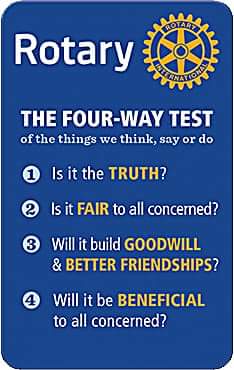
Rotarian Tony Moyer asked for help staffing this year's
4-Way Test Speech Contest at Emmaus High School and he now has the help he needs. He has invited additional Rotarians to be in the audience on February 7 at 2:30 p.m. at Emmaus High School.
And as we support our Interact Club, I thought it would be a good time to review:
What is the Four-Way Test?
Why is it on one of our banners?
Why do we occasionally recite it at the end of our meetings
The Four-Way Test is a nonpartisan and nonsectarian ethical guide for Rotarians to use for their personal and professional relationships. The test has been translated into more than 100 languages.
It was created over 70 years ago the midst of the Great Depression by a Rotarian to help rescue his beleaguered business.
That Rotarian was Herbert J. Taylor, born in Michigan and a graduate of Northwestern University. He did international work for the YMCA and served in the Navy during World War I. He is described as a mover, doer, a consummate salesman and a leader of men.
He and his wife settled in Chicago in 1925 and he began a swift rise in the Jewel Tea Company. He was asked to take on the leadership of the almost bankrupt Club Aluminum company and he put his own money into that effort.
A man of faith, Taylor prayed and then wrote a guiding ethical statement to help his company managers in their daily work. He decided that first 100-word statement was unwieldy and whittled it down to the 36 we now know.
He showed his four-point test to clergy and lawyers. He used it to guide the Club Aluminum industry he headed and to climb out of debt and begin paying dividends to stockholders.
In 1942, Rotary International adopted the 4-Way Test and in 1954, Taylor transferred the copyright to RI when he served as RI President.
Questions remain for us: Is the 4-Way Test useful today, for us in this highly technological, digital world?
Perhaps few things are more needed today than moral integrity.
"Eloquently simple, stunning in its power, undeniable in its results, The Four-Way Test offers a fresh and positive vision in the midst of a world full of tension, confusion, and uncertainty." (Darrell Thompson, Rotary of Morro Bay California)
The final test is in the doing. In his speech "About the 4-Way Test", Thompson quotes noted psychologist William James who said, "The ultimate test of what a truth means is the conduct it dictates or inspires." And Thompson championed our test by writing, "At the heart of Rotary today is the Four-Way Test, a call to moral excellence. Human beings can grow together. Modern business can be honest and trustworthy. People can learn to believe in one another."